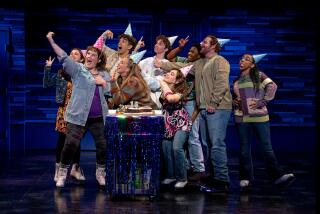STAGE REVIEW : TO BE OR NOT TO BE A âKUNI-LEMLâ
Avram Goldfadnâs Jewish play âThe Two Kuni-Lemlsâ is a product of the 1880s. âKuni-Leml,â the musical based on that play, which opened Sunday at the Westwood Playhouse, is a product of the 1980s.
Or is it?
It is steeped in the classical repertoireâs classic ploys: A father trying to secure a proper match for his daughter; a daughter whose heart is set on someone else; a chain reaction of tricky maneuvers exploded in a hilarious chase and an inevitably happy ending.
Where have you heard all this before? Let me count the plays: âThe Taming of the Shrew,â âThe Comedy of Errors,â much of Feydeau and almost all of Moliere, notably âTartuffe,â âThe Miser,â âThe Bourgeois Gentilhomme.â
In âKuni-Leml,â the hand-wringing father is Reb Pinkhos (an enchanting Shelley Berman) who agrees to marry his imperious, educated daughter Carolina (Andrea Roth) to the gimpy, one-eyed, hunchbacked, stammering shlemiel Kuni-Leml. The reason? Simply that Kuni-Leml is the first stepson of his brother-in-lawâs second wife (something like that) and a good man (the matchmaker says so) who studies all day and will make a dutiful husband.
Carolina, of course, has other ideas. She wants to wed her bright, young, good-looking, impoverished tutor, Max. Whatâs a daughter to do? Fool her dad, hatch a plot, marry Max anyway.
So Max (Geoffrey Donne) pretends to be Kuni-Leml, which makes poor Kuni-Leml (Jeremy Lawrence) wonder who he is if he isnât Kuni-Leml. (It also makes for the clever âWhatâs My Name?â sung to a turn by Lawrence).
The plot enlivens considerably when the matchmakerâs daughter (the spunky Sandy Rosenberg), the last person for whom papa Kalmen (a polished Ken Olfson) will think to bring home a husband, sets her marital sights on the real Kuni-Leml. From this point on âKuni-Lemlâ is a romp, literally and figuratively. Up to that point? Our feelings are as split as the showâs personality.
Thereâs nothing wrong with the Goldfadn plot on which Nahma Sandrow based the musicalâs book except that, once transplanted, it becomes unsure of its style.
Sandrow and composer Raphael Crystal gingerly straddle the 19th and 20th centuries without deciding exactly where they want their musical to fall. The Crystal music, with its powerfully traditional Jewish overtones, is semi-operatic--closer to operetta in this case than musical comedy.
Richard Altmanâs direction also acknowledges the turn of the century with its all-in-a-row staging and its deliberate heavy use of white light follow spots. And designer Richard D. Lawrenceâs 19th-Century sets and costumes, complete with phony beards and painted backdrop, underscore the gently satirical nod.
But thatâs the rub. This intentional dychotomy is too timid. It works 50% of the time and fortunately thatâs in the second 50% of the show, so that you canât get mad at âKuni Leml,â even if you canât always love it. Its start may be slow and uninspired, its leading lady (Roth) too priggish and its love duets (a spoof manque) too cloying, but it also has Berman and Lawrence and Rosenberg.
And it has Richard Engquist.
Lyricist Engquist is the one person on the creative team who has no doubts about the musicalâs identity. He knows exactly what he should be doing and does it, foiling our expectations with such Sondheimesque ripostes as âIâm nervousâ/âIâm Maxâ and regularly coming up with such true and delectable rhymes as Prussians/Russians/discussions.
Thanks to him we get such memorable songs as âThe Boy Is Perfect,â extolling the virtues of that paragon Kuni-Leml; âDonât Worry Darling,â the matchmakerâs daughterâs call to arms, rousingly delivered by Rosenberg; âA Little Learning,â or the Rebâs lament over the ravages of education (Berman at his very best).
Perhaps one reason the spoof doesnât always work is that not everyone here understands the nature of satire. Donne and Roth lack a sense of humor in their roles, and when they coo out the sentimental absurdities of âNothing Counts but Love,â they come across almost in earnest.
Ultimately, itâs Crystalâs music that seems the most misleading. It takes itself seriously when it should be smiling. And Altmanâs direction, along with Scott Shettleroeâs unimaginative non-dancer choreography, seem to play into the stylistic misconception.
This good-natured show had a healthy run last year, with a different cast, at New Yorkâs Jewish Repertory Theatre. Sundayâs enthusiastic audience appeared ready to give it the same here.
All we can add is mazeltov.
Performances at 10886 Le Conte Ave. in Westwood run indefinitely (213-208-5454).
More to Read
The biggest entertainment stories
Get our big stories about Hollywood, film, television, music, arts, culture and more right in your inbox as soon as they publish.
You may occasionally receive promotional content from the Los Angeles Times.










